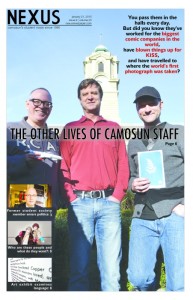Fundamentalist Islamic movements have been taking the world media by storm for a while now, creating mass paranoia in their wake. Movements like Al-Qaeda and the Taliban, and more recently ISIS and Boko Haram, are radical Islamic groups that have taken military arms under the Salafi movement. Salafi jihadism is a growing problem within the Islamic world, there is no doubt about that, but this is a problem that people don’t pay close enough attention to. With radicals seeping into Western society, people are as irrationally afraid and ignorant as ever.
A systematic attack recently took place on the controversial magazine Charlie Hebdo in Paris, France. A dozen of the magazine’s employees were killed in what’s believed to be a direct Islamic response to the magazine’s portrayal of their prophet, Muhammad. These radical Muslims believed they were avenging their prophet and following their religion’s teachings.

A racist hashtag began to trend on Twitter in response to the attack. People voiced their desire for genocide after seeing the news report about Charlie Hebdo on television. But anti-Muslim movements had taken to the streets of European countries even before the Charlie Hebdo attack happened, and over 15 mosques have been attacked in Paris alone in a barbaric response since the killings. This violent hostility towards Islam isn’t just happening far away from us: it’s everywhere.
Ever since 9/11 there has been a Muslim-hating movement that has seeped into almost every Western state.
I have come into contact with many people who have made jokes about Muslims with smug grins on their faces. Because of how we view Islam in this country, it somehow frees their incredibly racist and bigoted jokes and judgments. There are roughly 1.6 billion Muslims in the world; fear of a very small percentage of radicals doesn’t justify ignorance.
America’s long-stretching military power poses more of a threat to the Islamic world than they do to us.
It’s time to take a step back from the television and realize that a group of radicals doesn’t represent an entire nation, and instead look at ourselves and the type of power we’re exerting over Islamic countries.
I’m not saying the radical Islamist movement should be ignored because it doesn’t accurately represent the average Muslim. I’m saying that we need to learn to separate Muslims from radical Muslims, and recognize that they are nothing alike.

